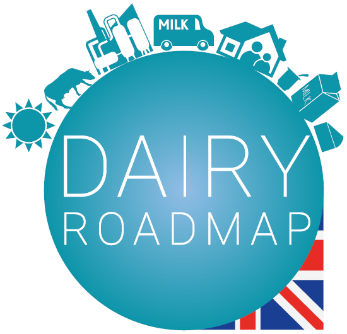Why on earth should net zero matter?
Wednesday, 13 April 2022
With increasing pressure on the industry and soaring costs of production, it can be difficult to think about anything other than overheads. Reducing our carbon footprint might, understandably, be falling down the agenda for many farmers.
But for Nic Parsons, AHDB’s Head of Dairy Development, the two go hand in hand. Efficiency is key to both resilience and sustainability. Effective nutrient management will maximise home grown forage and can help offset rising cost of production, while at the same time improving a farm’s environmental credentials.
To achieve this, it is vital to have a plan and a target. This is where the Dairy Roadmap comes in. It has been developed to help farmers and industry come together and begin to make these changes.
Lead in partnership between AHDB, Dairy UK and the NFU, the roadmap was formed in 2008 to help processors reduce the carbon footprint of the dairy industry. Since then, it has evolved to help farmers understand how they can also play their part in meeting the industry wide net zero target.
“This is the first time the focus on achieving net zero has been brought down to the farmer level,” says Nic. “A number of different organisations have looked to farming to be able to meet its goals sooner than the government target. And some processors are looking for a 30% reduction by 2030.
“The expectation is that most of the progress that farmers will make to start with will be around driving efficiency and productivity into their farms. This will not only benefit their bottom line, but also see improvements to their carbon footprint.”
How is the Dairy Roadmap project going to help?
“We need to start moving forwards as an industry, lowering our emissions, and focusing on that target of net zero,” says Nic. “We want to support the wider dairy industry to engage with the environment.”
The project consists of several working groups made up of both farmer and industry representatives. This ensures practical and targeted support can be offered to those looking to make changes to their businesses.
Two of these groups are looking at ‘benchmarking from baseline data’ and ‘best practice’. They will provide tools for farmers to understand how they compare to industry standards. This will help them identify simple and easy changes they can make within their business to increase their profit margins and start reducing their carbon footprint.
Ruari Martin, Farms Director at Myerscough College, is involved in the baseline data and benchmarking group. He points to the importance of the Dairy Roadmap in bringing different parts of the industry together. “We’re trying to make a plan that will work for all aspects of the industry,” says Ruari. “This will give us something to work to day-by-day and for the next few decades, as well as being something that we can measure ourselves against.”
Benchmarking is key to allowing farm businesses to understand their current performance and identifying changes. “Part of the work I’m doing is to draw a line in the sand that we can then measure ourselves against and use as a starting point for forward planning.”
Alongside this, the best practice working group is developing a series of Key Performance Indicators (KPIs) specific to dairy sustainability which will help farmers measure and understand their performance and make informed decisions about their business.
“The research and tools coming out of the project will help support evidence based decision making and the output from the groups, will help farmers identify those areas where they can make easy wins,” says Nic.
Accessing advice and government incentives
With the increasing challenges faced by the industry and farmers on a day-to-day basis, making time for this can be hard. The hope is that by getting on board early, farmers can drive their efficiency and sustainability before they are forced down the regulatory route.
AHDB’s Farm Business Review service is a good starting point. Funded by Defra’s Future Farming Resilience Fund, it is available to all dairy farmers based in England and was set up to help with the move away from direct payments. The Farm Business Review offers confidential, free, and impartial consultancy to those taking part. The consultants can also help identify which Environmental Land Management schemes might be suitable for a farm business. More information can be found at: ahdb.org.uk/farm-business-review.
Measuring to plan
For many, undertaking a carbon audit can also be a helpful indicator of how a farm business is performing. “The importance of any measurement on farm, including a carbon audit, is that change is made on the back of this to help support a more efficient way of producing milk,” says Nic.
“Fundamentally, a farm has to be sustainable from a profitability point of view before they can really invest further in innovative technology or practices.”
Further activity is planned throughout the year to help farmers assess their own business and make improvements. Releasing animal health stats will allow farmers to work with their own advisors to identify quick wins and implement improvements.
Nic concluded: “While the Dairy Roadmap is ultimately about reaching net zero, farmers should feel reassured that they’re already familiar with the areas that will help them get there - improving their efficiency at producing a litre of milk, maximising the value of their milk contract, and focusing on the health and longevity of their animals. Increasing efficiency and reducing environmental impact is a win-win for all farmers.”


